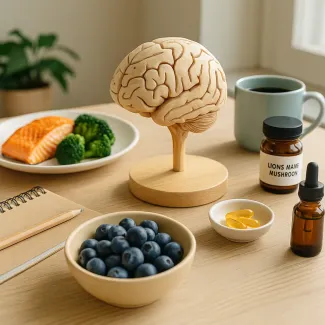
Smart Lifestyle Strategies for Mental Clarity in Your 30s
Daily practices to enhance focus, protect your brain and stay mentally sharp
As you enter your 30s, your body and mind begin to experience subtle changes. While you may still feel the vitality of youth, it's often the decade when mental fatigue, slower memory recall, and decreased focus start to surface—especially if cognitive health hasn’t been a priority. The good news is that adopting specific habits now can significantly improve brain performance, protect against cognitive decline, and help you maintain mental clarity, emotional stability, and motivational drive throughout adulthood.
The science of cognitive aging begins earlier than you think
By your mid-30s, subtle shifts in brain chemistry—such as reduced production of dopamine, acetylcholine, and serotonin—can influence how you focus, learn, and feel. While these changes are completely natural, the way you eat, move, sleep, and engage with your environment can dramatically affect how well your brain adapts. That means you have far more control over your memory, attention span, and energy levels than you may realize.
Prioritize restorative sleep for memory and regeneration
Sleep is more than rest—it’s a core function of your brain’s housekeeping system. During deep sleep cycles, your brain clears out neurotoxic waste through the glymphatic system, consolidates short-term memory into long-term storage, and repairs neural pathways. Aim for 7.5 to 9 hours of uninterrupted sleep per night, and support melatonin production by limiting blue light exposure at least 90 minutes before bed. A consistent sleep schedule also stabilizes your circadian rhythm, which is linked to hormonal balance and mental resilience.
Reduce chronic stress before it becomes neurotoxic
Chronic stress floods your system with cortisol, a hormone that in high doses can shrink the hippocampus—the region of the brain responsible for learning and memory. Practicing mindfulness, deep breathing exercises, and adaptive coping strategies like reframing or cognitive restructuring can reduce long-term exposure to elevated cortisol. Movement-based stress relief—such as tai chi, qigong, or walking in nature—combines mental and physical benefits for neuroprotection.
Move more to grow your brain
Physical exercise, especially aerobic training, increases brain-derived neurotrophic factor (BDNF)—a key protein that stimulates the growth of new neurons and synapses. Just 30 minutes of brisk walking, cycling, or swimming five times per week can improve executive function, working memory, and emotional regulation. Include coordination-based activities such as dance or martial arts to activate more complex neural circuits and boost cognitive flexibility.
Feed your brain with neuro-supportive nutrients
The brain requires high-quality fuel to operate efficiently. Omega-3 fatty acids—especially DHA—are essential for maintaining neuronal membrane fluidity and supporting synaptic transmission. Add fatty fish like sardines, mackerel, and wild salmon to your meals several times a week, or consider an algae-based supplement. Vitamins B6, B9 (folate), and B12 play a crucial role in neurotransmitter synthesis and homocysteine regulation, a key marker in neurodegenerative processes. Whole foods like leafy greens, legumes, eggs, and whole grains should be foundational in your 30s nutrition strategy.
Use nootropics wisely—natural first
Certain natural nootropics have shown promise in enhancing focus, reaction time, and mental stamina. These include rhodiola rosea, bacopa monnieri, L-theanine, and lion’s mane mushroom. While synthetic nootropics may offer short-term boosts, it’s crucial to prioritize safety and sustainability. Always consider your own biochemistry and consult professionals before introducing new supplements, especially if you’re managing chronic conditions or medications.
Build a resilient gut-brain connection
An imbalanced gut microbiome can impair mental clarity, emotional stability, and even contribute to brain fog. A diverse microbiota supports the production of neurotransmitters like serotonin and GABA, which regulate mood and focus. Incorporate fermented foods such as kimchi, sauerkraut, kefir, and miso, and eat a wide range of plant-based fibers to nourish your gut lining and reduce neuroinflammation. Polyphenol-rich foods like blueberries, green tea, and dark chocolate also protect both gut and brain health.
Avoid mental stagnation by challenging your brain
Neuroplasticity—the brain’s ability to rewire and adapt—is most active when we face new challenges. Regularly expose yourself to cognitive novelty: learn a new language, practice a musical instrument, solve puzzles, or try new strategic games. Activities that demand mental effort, working memory, and delayed gratification build stronger connections between prefrontal regions and improve decision-making, impulse control, and long-term planning.
Create focused time blocks to reduce distraction fatigue
The modern attention economy fragments our ability to concentrate. Multitasking and context-switching reduce your cognitive efficiency by up to 40%, especially if repeated throughout the day. Create deep work blocks where notifications are silenced, distractions are minimized, and a single cognitive task is pursued with full attention. Even 90-minute blocks of focused effort can dramatically improve mental clarity, task completion, and information retention.
Protect mental energy through daily rhythm awareness
Ultradian rhythms—natural 90- to 120-minute cycles of alertness and fatigue—dictate when we are most mentally sharp. Plan demanding cognitive tasks during your peak rhythm and take deliberate rest during the valley that follows. This rhythm management protects your prefrontal cortex from overuse, conserves motivation, and prevents burnout. Support these natural energy flows by aligning meal times, movement, and social interaction around them.
Strengthen emotional intelligence to stabilize your mood
Emotionally intelligent people handle stress and interpersonal friction with greater composure and strategic thinking. Practicing emotional labeling, empathy, and non-reactive listening helps regulate the amygdala—your brain’s threat-detection system—and strengthens the prefrontal cortex’s inhibitory control. This results in better impulse management, relationship satisfaction, and cognitive bandwidth to focus on your goals.
Eliminate digital clutter that reduces mental bandwidth
A constant stream of alerts, messages, tabs, and content consumption fragments your executive function. Implement digital hygiene practices like notification batching, device-free zones, and intentional screen time. Remove unnecessary apps and visual clutter from your phone’s home screen. These simple steps prevent attention leakage, improve mental rest, and free up working memory for creative and strategic thinking.
Cultivate meaning and motivation through purpose-driven living
People with strong internal purpose and direction exhibit better mental endurance, even under high stress or cognitive load. Connect your daily habits to long-term goals. Whether it’s career growth, family engagement, or creative fulfillment, aligning your life with intrinsic motivation rewires your brain to prioritize focus and resist distraction. Journaling, vision-mapping, and weekly planning rituals can embed this alignment into daily action.
Rebalance your hormonal system for mental vitality
Unbalanced cortisol, insulin, estrogen, or testosterone levels can significantly affect mental energy, mood, and focus. In your 30s, these hormonal signals begin shifting, especially with stress, poor diet, or sleep deprivation. Prioritize blood sugar balance with slow-digesting carbs and healthy fats, regulate cortisol through early daylight exposure and cold exposure, and support hormonal health through adaptogenic herbs like ashwagandha or maca.
Stay hydrated to maintain neurotransmitter function
Even mild dehydration—just 1–2% of body water loss—can impair cognitive performance, reduce short-term memory, and increase mental fatigue. Prioritize hydration throughout the day, especially in the morning. Add a pinch of natural salt or electrolytes to your water if you're active or live in a warm climate. Proper hydration improves synaptic firing, brain volume, and alertness.
Monitor blood sugar for better focus and emotional balance
Sudden drops in blood glucose can trigger irritability, brain fog, and poor decision-making. Aim for balanced meals that include protein, fat, and fiber to slow the glycemic response. Avoid high-sugar snacks that spike insulin and cause energy crashes. Instead, opt for snacks like almonds, boiled eggs, or apple slices with nut butter to stabilize energy and maintain mental steadiness throughout the day.
Develop a brain-nourishing morning routine
How you start your day shapes your brain's operating mode. A powerful routine might include light exercise, hydration, cold shower, protein-rich breakfast, 10 minutes of journaling, and goal visualization. This sets the stage for enhanced dopamine release, improved motivation, and clear executive function for the hours that follow. Avoid starting your day with social media or email, which hijacks your focus and emotional reactivity.
Practice gratitude to rewire your mental baseline
Gratitude has been shown to shift the brain’s default mode from threat scanning to resource awareness. Just three minutes of intentional appreciation per day activates the ventromedial prefrontal cortex, increasing emotional stability, motivation, and positive memory recall. Consider incorporating gratitude journaling or shared reflections into your evening wind-down to lock in a more resilient emotional baseline.
Engage with sunlight and natural light for mood regulation
Sunlight exposure early in the morning—especially within the first hour of waking—resets your circadian rhythm, reduces sleep latency, and increases serotonin production. This leads to improved mood, focus, and cognitive flexibility. Spend 15–20 minutes outdoors, preferably with no sunglasses, and try to work near a window or under full-spectrum lights if you’re indoors most of the day.
Make social connection a mental health priority
Social interaction stimulates oxytocin and endorphins, neurotransmitters that support emotional regulation and resilience to stress. Engage in face-to-face conversations, maintain meaningful friendships, and practice active listening. Avoid isolation—especially in remote work settings—and replace screen time with social rituals, shared meals, or hobby groups whenever possible.
Train metacognition to optimize learning and memory
Metacognition—your ability to think about how you think—amplifies learning speed, memory consolidation, and problem-solving. Reflect on how you process information, recognize cognitive biases, and adjust strategies based on outcomes. Keeping a learning journal, setting intentional goals for each task, and regularly reviewing mental performance will help you grow your intelligence over time, not just maintain it.
Align your physical and cognitive rhythms through movement microdosing
Movement isn't just about workouts—short bursts of motion throughout the day activate the reticular activating system, responsible for alertness and filtering information. Try 5-minute movement microdoses: stretches, squats, jumping jacks, or stair climbs every 60–90 minutes. These activities boost blood flow to the brain, reduce sedentary fatigue, and refresh your working memory between tasks.
Embrace silence and stillness to replenish cognitive reserves
In a world flooded with input, silence is an underrated tool for mental regeneration. Periods of intentional stillness—free of screens, noise, or conversation—allow your default mode network to process, integrate, and declutter mental noise. Whether through meditation, silent walking, or quiet journaling, this practice sharpens mental clarity, reduces overwhelm, and enhances creative insight.





